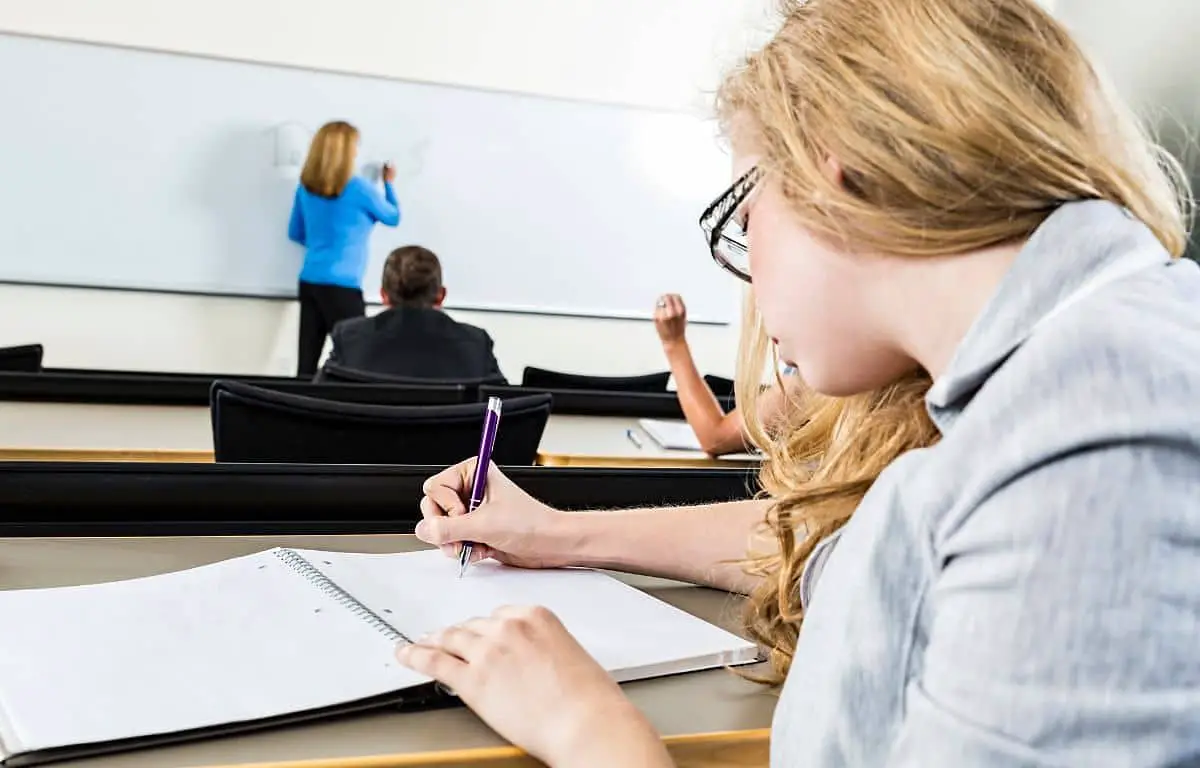Are you a student who is trying to figure out the best way to remember everything you’ve learned?
Do lectures and settling down to a study session overwhelm you, leaving you a little confused and lost when trying to remember key points?
If so, don't worry! You're not alone
As a seasoned ex-uni student, I've battled with the active recall vs note taking method for 10 years. I was obsessed with finding study tips on different ways to take effective class notes. The idea of having aesthetically pleasing good notes was all I could think about.
I would think when it comes to effective note-taking if my notes aren't pretty, then I wouldn't want to study from them and might fail my exams.
Note-taking is a popular and proven way to help you level up your study, there is another strategy also known to be successful in helping students retain knowledge. It’s called active recall.
In my helpful blog post today, I’ll walk you through the answer of what active recall actually entails and how it differs from traditional note-taking methods.
By learning about both strategies and their advantages, let’s get you better prepared and ready to improve your academic performance and smash your study goals!
So let’s get the mini takeaway before we get into the details!
This post is all about active recall vs note taking.
ACTIVE RECALL VS NOTE TAKING
Both active recall and note-taking have their own advantages, but which is best depends on individual needs. Note-taking and active recall strategies can be combined for an even more effective studying approach. Combining the two techniques can be beneficial for better memorization and understanding of the material.
Ok so now we’ve got the short answer, so you can get the heads up on the active recall vs note taking debate, let’s begin by discovering a little background on active recall.
Active Recall Explained
Have you ever been studying for an exam and realized you couldn't remember what you had learned? Don’t worry. You’re not alone!!
So what is active recall and how can it help?
Active recall is the process of actively trying to recall information from your memory, rather than rereading notes or textbooks.
It’s a type of active learning and means you directly engage with the material.
This helps strengthen your memory and increases the chances of retaining the information long-term.
It usually involves techniques that you’ve most likely used before such as quizzing yourself, use flashcards, make practice tests or practicing problem-solving.
It’s good to know this method is also backed up by science!
There have been many studies which have discovered that active recall can significantly boost your memory retention ability and improve your test performance.
“Active recall is the process of actively trying to recall information from your memory, rather than rereading notes or textbooks.”
Why does active recall work?
By attempting to retrieve information from your memory, you strengthen the connections in your brain that are responsible for that information.
When you engage your brain in actively recalling information, it strengthens the neural pathways in your brain, making it easier to remember the information later.
It’s also a useful technique that helps you identify gaps in your knowledge, allowing you to focus on areas that need improvement.
The more you practice active recall, the stronger those brain pathways become, which over time, means you will be able to more easily recall of the information.
So, whether you're trying to learn a new skill, cram for an important test or study for an exam, incorporating active recall into your study sessions can make a huge difference in how effectively you can remember crucial info! .
Ok so although it sounds fairly obvious, let’s find out more about note-taking. This way we can start to see which method may be the best for you.
“By attempting to retrieve information from your memory, you strengthen the connections in your brain responsible for that information.”
What is note-taking?

Note-taking is simply writing down key points or information from textbooks, lectures, or other sources you'll need to remember for your exams.
Note-taking helps you stay engaged and focused during lectures because you're actively processing information rather than just passively absorbing it.
Many scientific studies prove that ‘jogging the memory’ is a successful way of retrieving and retaining information.
Having well-organized notes can make all the difference when trying to memorize and understand complicated topics.
Plus, notes are obviously a great reference when it comes study time for exams.
Sifting through countless pages of textbooks to find the necessary information is a pain!
So, grab a pen and paper (or your laptop if you prefer), and jot down those important pieces of information!
By the way, for more great tips on note taking head over to another of my helpful articles, 10 common note-taking mistakes to avoid.
“Having well-organized notes can make all the difference when trying to memorize and understand complicated topics.”
Why does note-taking work?
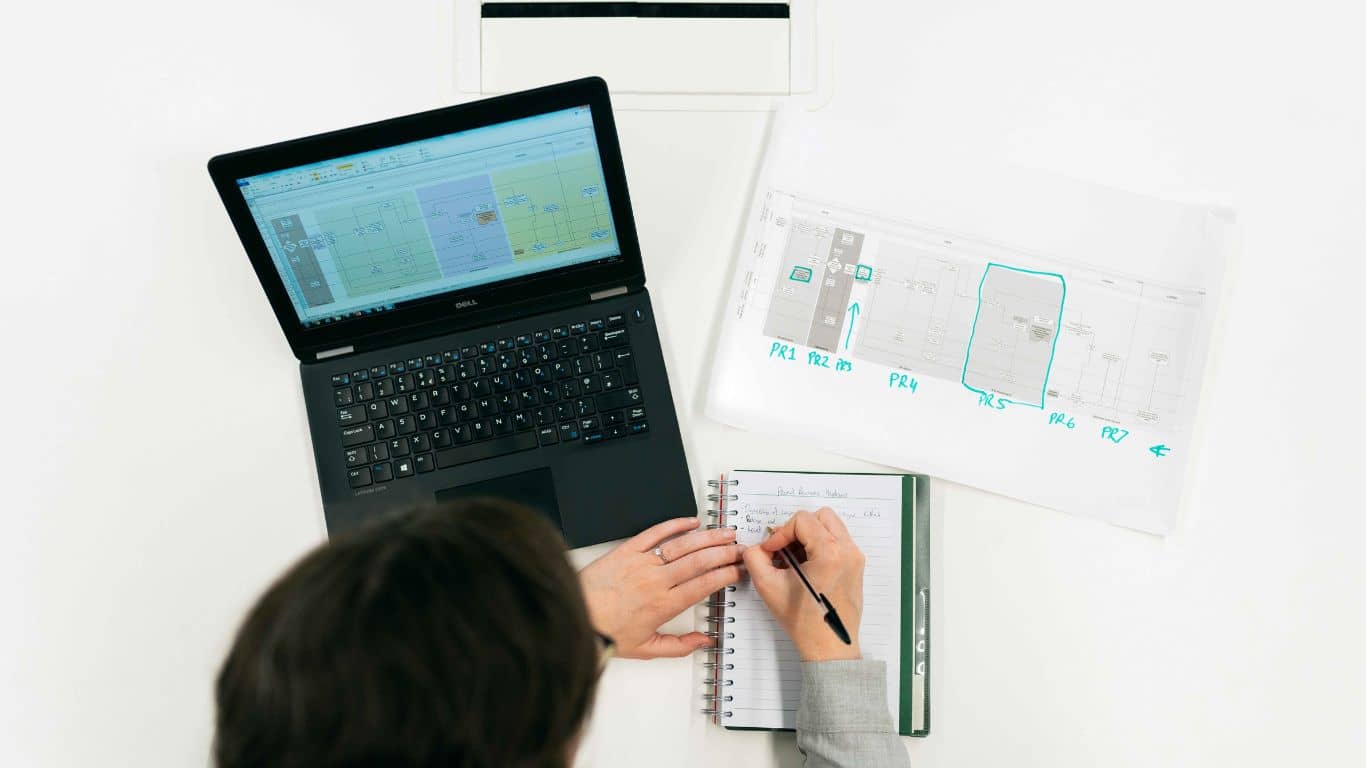
Have you ever wondered why taking notes is such a popular study technique?
There are a wealth of studies conducted on this method of studying.
Interestingly one study by Harvard researchers found that re-reading your own self-written notes is a much more successful study method than simply reading from textbooks or even reading other students' notes!
So it's not down to simply just having a written record of information, there's actually a lot more going on in your brain beneath the surface!
When you take notes, you're engaging with the material in a deeper way than if you were just listening or reading.
You have to actively process and summarize the information, which helps to cement it in your memory.
Plus, the act of physically writing things down can make a big difference!
it's like your brain gets an extra signal that this information is important and worth remembering.
So as we have found out, both of these methods of studying have positive benefits. But is it possible to find out if one is better than the other?
“your brain gets an extra signal that this information is important and worth remembering”
Read on to find out more.
Active recall vs Note taking: Which is best?
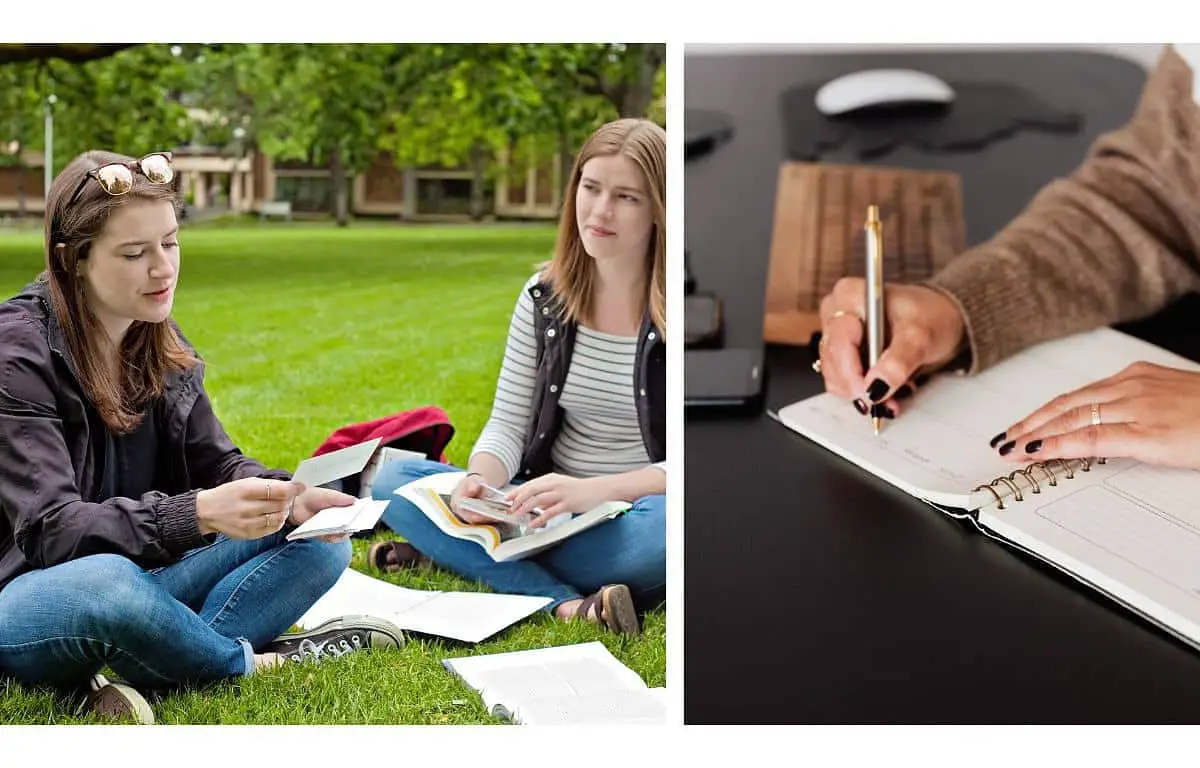
So is one study style better than the other?
To help you make the right choice, let’s look at some of the differences and similarities between these two techniques.
Active recall involves recalling information that has already been learned.
- Test yourself: The process typically involves asking yourself questions about the material and then answering them as accurately as possible in your own words (retrieval practice).
- Deeper understanding: It helps improve your understanding of the material by encouraging deep comprehension rather than just memorizing it for later use.
For example: if you were studying for a history test, you might recite out loud key facts from various time periods or battles. This would be you doing active recalling!
On the other hand, note-taking involves writing down the key/ main points from lectures or readings in order to use them to remind yourself of key facts.
Note-taking:
- Helps you to organise: Note-taking is a great way to sort information into an easily accessible format and can be helpful when reviewing material just before an exam.
- Quickly capture details: Note-taking also allows you to capture information quickly so that you don’t miss any important details.
Despite the differences in approach, both active recall and note-taking have their advantages.
Active recall encourages a better understanding of the material by helping you remember more accurately, while note-taking helps save time and makes it easier to review material right before an exam.
So whether active recall or note-taking is best depends on what works best for your individual needs.
If you find yourself struggling with remembering key details, then actively recalling the material may be a better option.
However, if you need to save time and review information quickly, then note taking might be more suitable.
Related Article: ACTIVE RECALL VS PASSIVE LEARNING: WHAT’S MORE EFFECTIVE?
The SQR Method: A Powerful Tool for Active Recall
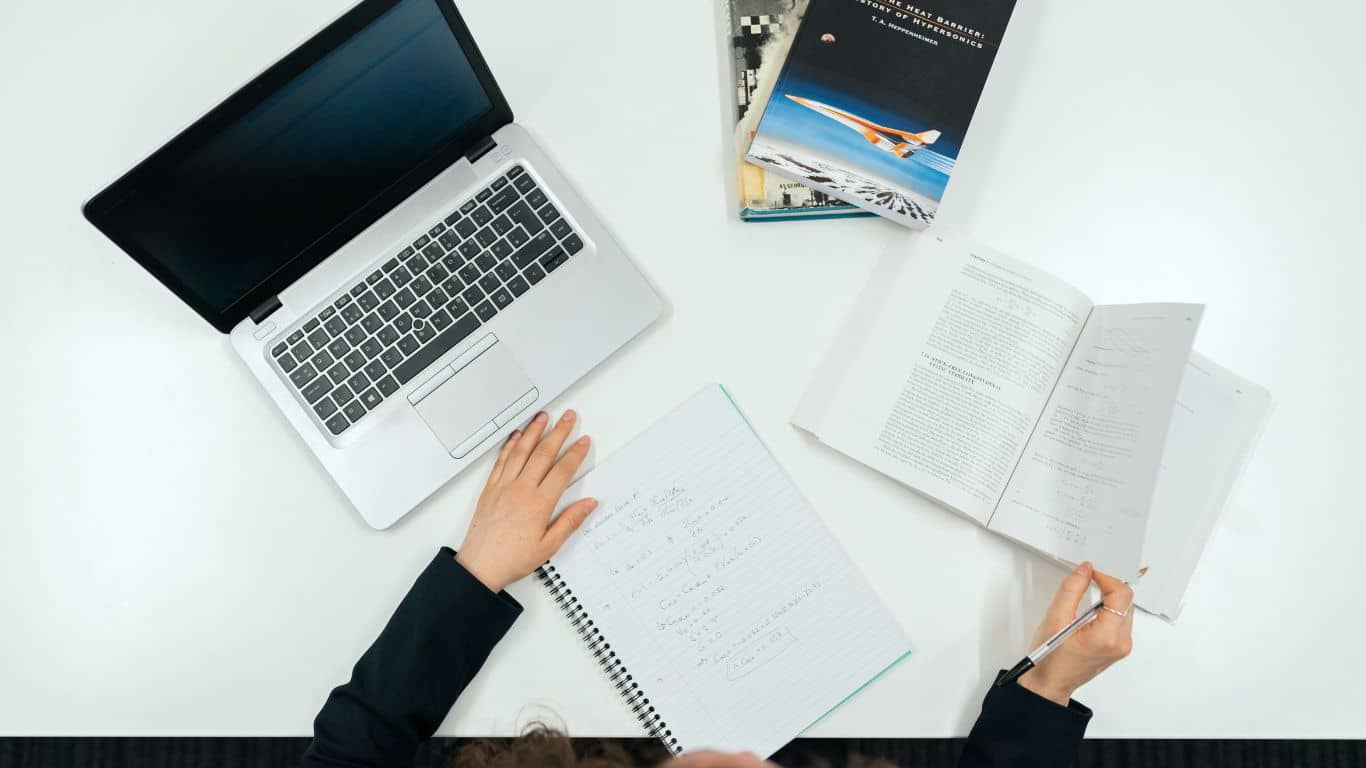
Survey: Creating a mental palace of the information
The first step in the SQR method is Survey. This step involves scanning through the material to get an overview and create a mental palace of the information. The purpose of this step is to familiarize yourself with the material and establish a foundation for active recall.
To effectively survey the material, you need to approach it with an open mind and curiosity. Start by skimming through headings, subheadings, and bolded words to get an idea of what the material is about. Then, read through each section or paragraph carefully, paying attention to key concepts, main ideas, and examples.
As you survey the material, try to visualize it in your mind's eye. Imagine that you are walking through a palace filled with rooms that represent different aspects of the information. Create mental images that help you remember information/ key points and connect them together in meaningful ways. This words best for visual learners.
Question: Formulating practice questions based on the material
The second step in the SQR method is Question. In this step, you formulate practice questions based on the material and store them in your mental palace. The purpose of this step is to engage with the material actively and deeply by asking yourself thought-provoking questions.
To effectively formulate questions, start by identifying key concepts or an idea from your surveying process. Ask yourself what these important concepts mean or how they relate to other ideas within the material. Then, use these questions as a guide for further exploration.
As you formulate questions, try to make them specific and focused on understanding rather than memorization.
Instead of asking "What are three types of clouds?" ask "How do cumulus clouds differ from stratus clouds?"
For Example
Recall: Retrieving information by answering formulated questions
The third step in the SQR method is Recall. In this step, you retrieve information from your mental palace by answering the questions you formulated earlier. The purpose of this step is to test your understanding of the material and reinforce your memory.
To effectively recall information, start by selecting a question from your mental palace. Then, close your eyes and try to visualize the answer in as much detail as possible. Use all of your senses to imagine the information and connect it to other concepts within the material.
If you can't recall the answer immediately, don't worry. Take a moment to review the material again and try formulating new questions that will help you remember things. Repeat this process until you feel confident in your ability to recall the information accurately.
Active Recall vs Recognition and Passive Review
To study better, don't just read your notes. That's called passive review and it doesn't help you remember things for a long time. Instead, try active recall. That means you try to remember the information without looking at your notes. This makes your brain work harder and helps you remember things better later on.
Just recognizing information isn't as good for remembering as active recall. So, passive review is NOT the way to go. Retrieval practice is a more effective way to study.
Using Active Recall to Ace Your Next Exam

Why Active Recall is Key to Academic Success
Active recall is a powerful tool that university or college students can use to improve their academic performance both in and out of university. By using active recall, students can strengthen their memory and retention of important information. In this section, we will explore why active recall is key to academic success.
Strengthening Memory and Retention
Active recall involves actively retrieving information from the mind, rather than simply reviewing notes or textbooks. This process helps to solidify the information in the brain and make it easier to recall later on.
Studies have shown that when students use active recall strategies/ techniques such as flashcards or practice testing/ quizzes, using concept maps, mind maps and other effective revision techniques they are more likely to remember the material long-term.
Improving Understanding of Complex Concepts
In addition to strengthening memory and retention, active recall can also help students improve their understanding of complex and important concepts. When students actively engage with the material they are studying, they are forced to think critically about it and make connections between different pieces of information.
This deeper level of engagement can lead to a better understanding of the material and improved performance on exams.
Performing Better on Exams
By incorporating active recall into their study routine, students can improve their performance on exams. When students use active recall study methods such as practice testing/ quizzes, create digital flashcards using a flashcard app, they are better able to retrieve information quickly and accurately during an exam.
This can help reduce test anxiety and increase confidence in one's ability to perform well.
Using Active Recall for Any Subject: Tips and Techniques
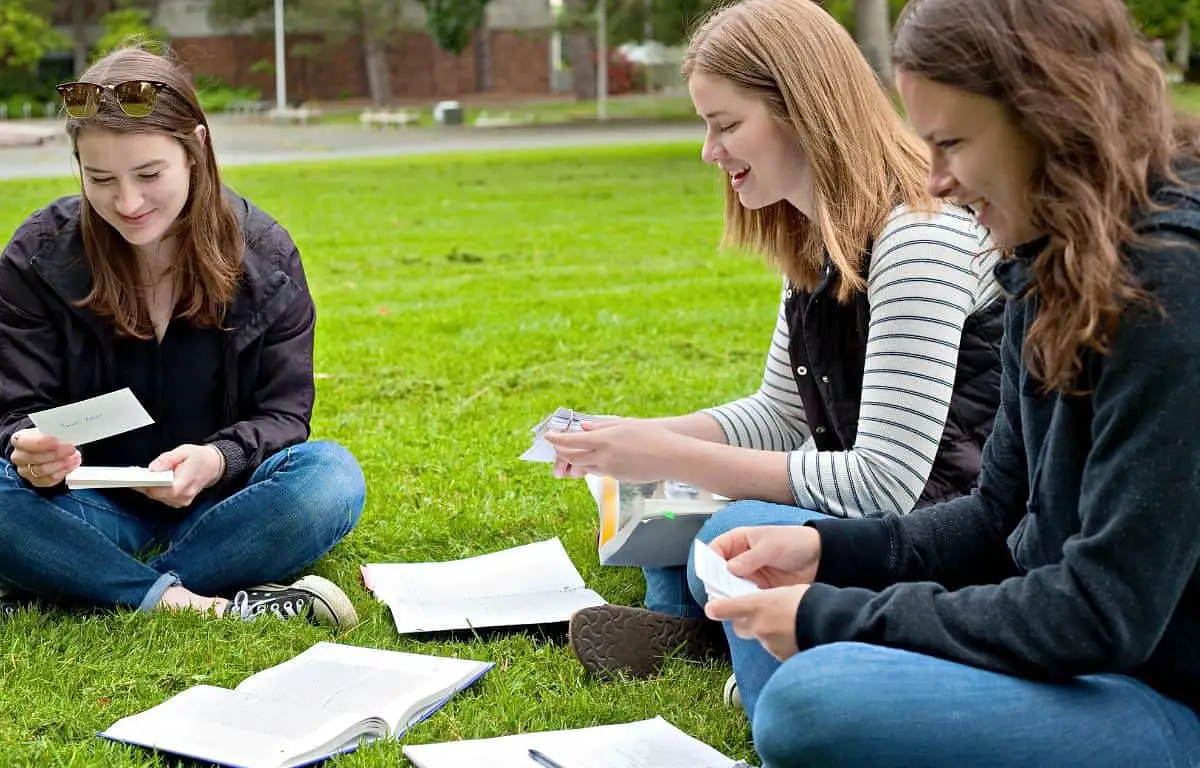
Flashcards with Questions and Answers
One of the most effective active recall strategies/ techniques for using active recall is creating flashcards with questions on one side and answers on the other side of the flashcard.
This technique forces learners to retrieve information from memory, which strengthens their ability to recall information later. You can use a flashcard for any subject or topic, making them a versatile learning tool.
When creating your flashcard, it's important to focus on key concepts or ideas rather than trying to memorize every detail. By condensing information into bite-sized pieces, learners can more easily retain and recall important information.
It's helpful to use visual aids such as diagrams or images when appropriate, as this can aid in memory retention.
Practicing Retrieval Without Notes
Another tip for using active recall is practicing retrieval without notes or textbooks. This involves attempting to recall information from memory without any external aids. While this may seem challenging at first, consistent practice can lead to significant improvements in retention and recall.
To practice retrieval without notes, learners should start by reviewing material until they feel comfortable with the content. They should then attempt to recall key concepts or ideas without looking at their notes or textbooks. If they are unable to remember something, they should review that specific piece of information before continuing.
By consistently practicing retrieval without notes, learners will strengthen their ability to recall information from memory alone. This technique is particularly useful for exams or situations where external aids are not available.
Benefits of Active Recall
Using active recall as a learning technique offers numerous benefits for learners of all ages and abilities. By engaging with material through retrieval practice, learners are able to better understand and retain important concepts and ideas.
Active recall allows learners to identify areas where they may need additional study or review. By focusing on areas where they struggle during retrieval practice, learners can improve their overall understanding of a subject.
Finally, using active recall as a learning technique can lead to better performance on exams and assessments. By strengthening their ability to recall information from memory, learners are better equipped to demonstrate their knowledge and understanding of a subject.
Note-taking and Active Recall Together
An interesting point to remember is that note-taking and active recall can have some overlaps.
For instance writing questions alongside your notes is a form of active recall.
When you’re revising, your notes will prompt you to actively think, instead of only passively reading your notes.
A combination of both styles will help you layer up your study techniques and give yourself the best chance of smashing your exam or test!
The Benefits of Active Recall vs Note Taking

Active Recall Helps Retain Information Better Than Note Taking
Most people tend to rely on taking notes. However, research shows that active recall is a more effective method for retaining information than note-taking. Active recall involves recalling information from memory without any cues or prompts. This technique helps to reinforce the neural pathways in the brain and improve long-term memory retention.
One study conducted by Karpicke and Roediger (2008) found that students who used active recall performed significantly better on exams than those who relied solely on note-taking. The researchers concluded that active recall was a more effective method for retaining information because it required students to engage with the material at a deeper level.
Another study conducted by McDaniel et al. (2009) found that students who used active recall were able to remember more information over a longer period of time than those who relied on note-taking alone. The researchers also found that active recall improved critical thinking skills and promoted deeper understanding of the learning material.
Active Recall Improves Long-Term Memory Retention
Active recall not only helps retain information better than note-taking but also improves long-term memory retention. When you actively retrieve information from your memory, you strengthen the neural connections associated with that particular piece of information. This process makes it easier to retrieve the same piece of information in the future.
Research has shown that spaced repetition combined with active recall can significantly improve long-term memory retention. Spaced repetition involves reviewing material at increasing intervals over time, which reinforces neural pathways and strengthens memory retention.
In one study conducted by Bahrick et al. (1993), participants were asked to learn Spanish vocabulary words using either massed practice (cramming) or spaced repetition combined with active recall.
The researchers found that participants who used spaced repetition combined with active recall were able to remember more vocabulary words over a longer period of time than those who relied on massed practice.
So, active recall and spaced repetition produced the best results and so, its the better way to go!
Related Article: 2 SECRET NOTE TAKING TECHNIQUES FOR STUDENTS- APPLY THESE NOW!
Active Recall Promotes Deeper Understanding of the Material
Active recall not only helps retain information better and improves long-term memory retention but also promotes deeper understanding of the material. When you actively retrieve information from your memory, you engage with the material at a deeper level than when you simply read or take notes.
One study conducted by Roediger and Karpicke (2006) found that active recall improved conceptual learning more than other methods such as re-reading or summarizing. The researchers concluded that the active recall method promoted a deeper understanding of the material because it required students to make connections between different pieces of information.
Another study conducted by Agarwal et al. (2014) found that active recall enhanced metacognitive monitoring, which is the ability to monitor and regulate one's own learning.
The researchers concluded that active recall helped students develop a better understanding of their own learning process, which in turn led to better academic performance.
Active Recall Enhances Critical Thinking Skills
Finally, active recall not only helps retain information better, improves long-term memory retention, and promotes deeper understanding of the material but also enhances critical thinking skills. When you actively retrieve information from your memory, you engage with the material in a way that requires you to analyze and evaluate it.
One study conducted by Butler et al. (2010) found that active recall improved critical thinking skills more than note-taking or re-reading. The researchers concluded that active recall helped students develop higher-order thinking skills such as analysis and evaluation.
Another study conducted by Kang et al. (2007) found that active recall improved problem-solving skills more than other methods such as re-reading or summarizing. The researchers concluded that active recall techniques helped students develop a better understanding of how to apply their knowledge to real-world situations.
Active Recall Vs Note Taking - To end

So it’s fairly clear to see both methods of study can help you ace your studies like a pro! So it’s well worth understanding a little more about both methods so you can choose the best approach and level up those study techniques.
Both techniques can help you remember information more effectively and make studying easier. Ultimately, which is best depends on your individual preferences and situation!
If i'm being biased, active recall is the most effective study method and students should use more active recall study techniques in the study plan. Especially, if they want to pass their exams and remember what they've learnt in the long run.
To discover more about different types of study techniques and how active recall can help, check out another of my helpful articles Active Recall Vs Passive Learning or discover 10 Top Tips For Remembering Everything
I hope you found the answers you were looking for in this article, I make a point to remind you that although you may attend university, it is not you’re whole future. There is a world outside academic performance, so don’t forget to check back for regular student support on my weekly blog.

